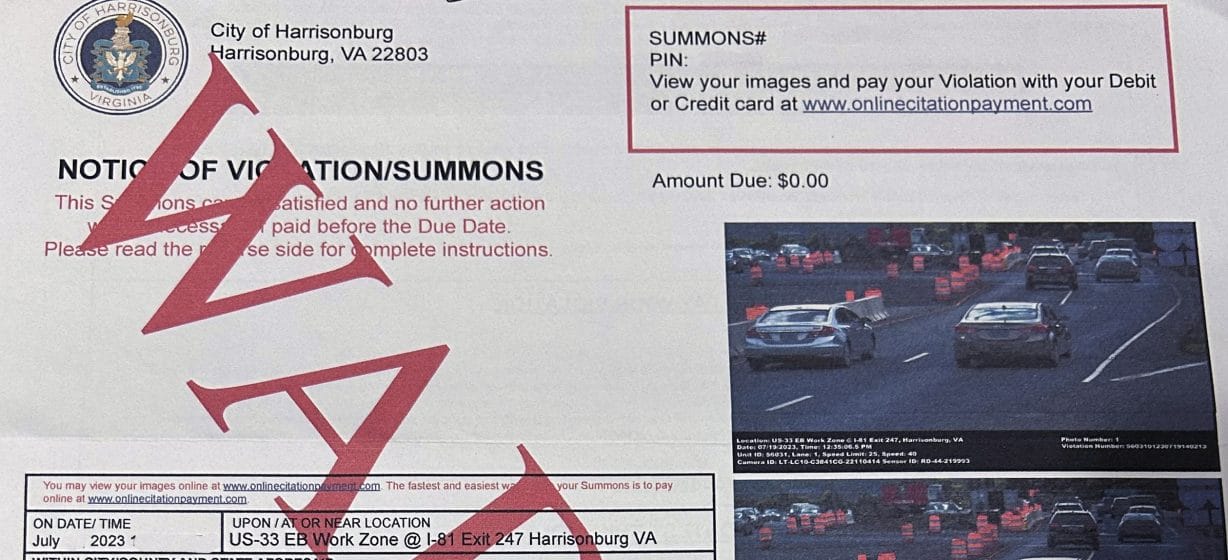By Avery Goodstine, contributor
Since last summer’s installation of speed cameras in the 25-mph work zone on East Market Street over I-81, more than 28,000 citations have gone out to drivers, city officials confirmed Tuesday.
The fine for speeding in the zone is $100, meaning the tickets have generated $2.8 million in revenue, from which the company that installed and operates the camera receives as 12% cut, as city council members heard during an update about the cameras at Tuesday’s meeting.
After the cameras were installed last summer, the city instituted a 60-day warning period during which drivers caught speeding weren’t fined but received a notice in the mail. During this period, the Harrisonburg police sent out more than 40,000 warnings.

After the warning period, from September to February an average of 4,733 citations per month went out.
The city pays Altumint, the company that owns the cameras and aids in the citation process, just under $4,000 a month for the cameras in addition to a $12 service fee per ticket. Since issuing citations in September, this means Altumint has made nearly $370,000 off of these speed cameras.
Chief of Police Kelley Warner and Director of Public Works Thomas Hartman told the council that the speed cameras have succeeded in lowering the average speeds of cars passing through the East Market work zone during the work zone enforcement time of 7 a.m. to 5:30 p.m.
By now, only about 1% of those driving through the work zone are going speeds that would warrant a citation, Hartman said.
Still, Warner said this system hasn’t been perfect. She said the police department has received complaints about Altumint’s customer service line being down and notices being sent to the wrong address. However, the Harrisonburg police and Altumint are working hard to minimize these issues, she said.
Warner said citations will be issued only after a police officer approves them. Every time the camera takes a photo, an officer double checks that the license plate is clear and there’s no doubt about which car was involved in the speeding infraction.
Altumint CEO Holly Cooper said the company tested its customer service line multiple times and have not experienced any “dead air,” as was reported by some people.
“We have made sure that our customer service reps understand when people call if there’s frustration or something happens we apologize profusely,” Cooper said. “It doesn’t matter that 25,987 [people] were fine. They were one of the 13 that had a problem … and when we have an issue like this, I make sure as CEO, I address this myself.”
Council member Dany Fleming raised more concerns about the amount of time it takes between getting caught by the speed camera and receiving the citation in the mail.
“I get the behavior has to change but they haven’t been notified of that behavior,” Fleming said.
Cooper said public information and education is most important, and she said she thinks the city is doing a good job informing people about these types of changes.
“I don’t know that you could find a citizen in Harrisonburg that doesn’t know that these cameras are there,” she said.
Cooper also said Altumint tries to get all the photos to the police five to six days after they’ve been captured, and the citations get issued the day after an officer approves them. After that, it’s in the hands of the postal service to deliver them, she said.
Fleming also asked if the police can use alternative methods that have the same effect on lowering overall car speeds, such as physical cop cars instead of cameras. Warner said she doesn’t have enough staff for that. And, she said, the system is doing what it was set up to do: create a safer environment for people in the work zone.
“We don’t want this to be a ‘we gotcha,’” Warner said. “One of the main goals is education, which is what I believe the program has accomplished, for changing behavior.”
Presbyterian Shenandoah homeless shelter kitchen donation approved
The council unanimously voted to accept a $50,000 donation from Presbytery of Shenandoah for a commercial kitchen at the Homeless Services Shelter — an offer that came with the condition that the city cover the rest of the bill for the kitchen upgrade. The kitchen will be in the new Open Doors facility, which is being built on the Presbytery’s former land.
After having to alter the original kitchen design in order to allot for the necessary amount of meals, the price of the kitchen increased to more than $185,000.
Thanks for reading The Citizen, which won the Virginia Press Association’s 2022 News Sweepstakes award as the top online news site in Virginia. We’re independent. We’re local. We pay our contributors, and the money you give goes directly to the reporting. No overhead. No printing costs. Just facts, stories and context. We value your support.












